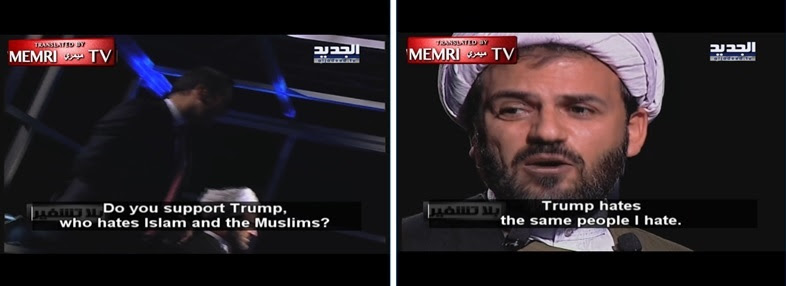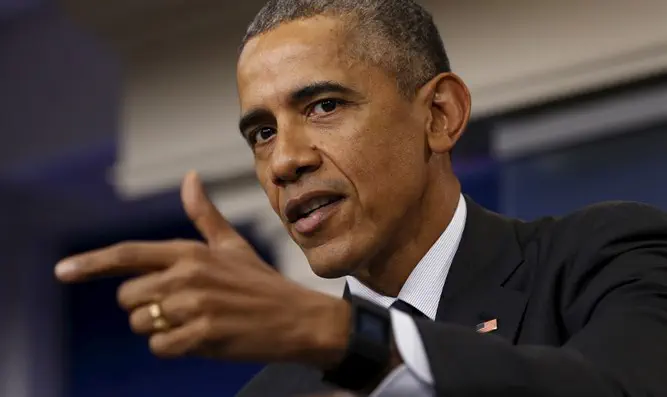by MEMRI
Mohammad Al-Hajj Hassan: "Trump hates the same people I hate."
Lebanese Shi'ite
cleric Sheikh Mohammad Al-Hajj Hassan said that he was proud to be receiving
U.S. citizenship next year: "I am more than proud that I will have
citizenship of a country that respects me as a human being and as a citizen."
Sheikh Hassan added that while he was proud to be Lebanese, "all I've
gotten from it is an empty identity card." Speaking on the Lebanese
Al-Jadeed/New TV channel on November 16, Sheikh Hassan responded to the
interviewer's accusations, saying that he had applauded Trump at a rally and
that the Muslims must distance themselves from the extremists "who purport
to be Muslims" and who create a negative image of Islam in the West.
Sheikh Hassan presented the interviewer with a model of the U.S. eagle, saying:
"I hope that the whole world will learn [from the US] how to build a
country and how to establish liberty."
Interviewer: "Why do you appear in the media today?"
Mohammad Al-Hajj
Hassan: "In order to
share my ideas."
Interviewer: "Wouldn't it be better if you were
sitting in a mosque, and teaching religion to the people, instead of..."
Mohammad Al-Hajj
Hassan: "Not at all, it
has all become useless."
Interviewer: "Really?"
Mohammad Al-Hajj
Hassan: "Yes, it has
all become useless."
Interviewer: "God help me!"
Mohammad Al-Hajj
Hassan: "The natural
role of the mosque has been distorted. The role of the clerics has been
distorted too. The clerics no longer focus on guidance and reforms. They have
all become employed in the service of the ruler. What we are trying to say
today to the people is that they should extract themselves from the culture of
worshipping people."
[...]
Interviewer: "Who do you think you are, sheikh?"
Mohammad
Al-Hajj Hassan: "Me?"
Interviewer: "Answer me before I tell you what the
people think of you."
Mohammad Al-Hajj
Hassan: "I am a bright
star, shining in the darkness in which you live."
Interviewer: "Us?!"
Mohammad Al-Hajj
Hassan: "Yes, you."
Interviewer: "Aren't you the one who is living
without a shining star?"
Mohammad Al-Hajj
Hassan: "Not at all. It's
the other way around."
Interviewer: "Sheikh, you are living in great
darkness..."
Mohammad Al-Hajj
Hassan: "The other way
around. Let me tell you: I have self-confidence, and I feel that I am truly my
own master. I feel that I have a lot of self-confidence, that my decisions are
made in freedom, and that my viewpoints are in keeping with my actions.
Therefore, I feel sorry for all those who are living in this injustice and
misguidance."
[...]
Interviewer: "You are being accused of distorting
the image of the Shia today."
Mohammad Al-Hajj
Hassan: "Listen, my
dear sir, the Shia is not a company or an institution. Shia is an ideology that
sprang out of Islam. I see myself as a true Muslim. I don't need anybody's
testimony or certificate to tell me that I'm a Shi'ite. I don't care what these
lowly creatures say about me. I only care about what reasonable people say
about me."
[...]
Interviewer: "You are a Shi'ite."
Mohammad Al-Hajj
Hassan: "Right."
Interviewer: "Yet people say: 'Has he no shame to
call himself a Shi'ite?'"
Mohammad Al-Hajj
Hassan: "Not at all."
Interviewer: "Some people are ashamed that you call
yourself a Shi'ite. They don't consider you to be a Shi'ite. Let me tell you
everything they say. People say today that it's a disgrace that a man like you
is a Shi'ite and a sheikh. How do you respond to that?"
Mohammad Al-Hajj
Hassan: "To this group
of people I would like to say that I create my own Shi'ite belief. I define the
ideology to which I want to belong. I choose the Shi'ite principles that suit
me, and I adhere to them. I am not one to sink into the folds of history. I am
not one to live in harmony with texts and fatwas that the mind cannot accept."
[...]
Interviewer: "What do you think of someone who hates
Islam?"
Mohammad Al-Hajj
Hassan: "That is
between him and Allah."
Interviewer: "What do you think about him?"
Mohammad Al-Hajj
Hassan: "It's between
him and Allah."
Interviewer: "Would you support him?"
Mohammad Al-Hajj
Hassan: "Certainly not."
Interviewer: "You would not support him?"
Mohammad
Al-Hajj Hassan: "No."

Interviewer: "Do you support Trump, who hates Islam
and the Muslims?"
Mohammad Al-Hajj
Hassan: "Trump hates
the same people I hate."
Interviewer: "Did you applaud him?"
Mohammad Al-Hajj
Hassan: "Of course."
Interviewer: "Aren't you ashamed that you were in
one of his rallies, and you waved him goodbye?"
Mohammad Al-Hajj
Hassan: "Not at all. I
would applaud him again."
Interviewer: "The man hates Islam and the Muslims,
yet you applaud him live on air?!"
[...]
Mohammad Al-Hajj
Hassan: "What is the
meaning of the hatred toward the Muslims?"
Interviewer: "Ask him that."
Mohammad Al-Hajj
Hassan: "I did, and I
will answer you on his behalf."
Interviewer: "Did he answer you?"

Mohammad Al-Hajj
Hassan: "Yes, I'll answer
you on his behalf. As long as a group of people who purport to be Muslims
creates a certain image of Islam for the West, according to which we are all
mass murderers, we humiliate anyone who messes with us, we carry out beheadings
and crucifixions, we chop off peoples' hands and feet, we eat human hearts, and
so on... As long as the West sees us in this light, you will continue to hear
the same tune from Trump and others. The mission of the true Muslim, who can
reach Trump and others like him, is to tell Trump, the international community,
and the Western peoples that these people have nothing to do with Islam. True
Islam rejects these people and exposes them for what they are. Those who were
upset by my meeting with Trump are too cowardly to say to the Nusra Front, to
ISIS, and their ilk that they are not (true) Muslims.
[...]

"Next year is the
year that I will receive my (American) citizenship."
Interviewer: "Are you proud of that?"

Mohammad Al-Hajj
Hassan: "I am more than
proud that I will have citizenship of a country that respects me as a human
being and as a citizen, a country in which I can truly feel that I am a
citizen."
Interviewer: "What about the country in which you
are living now?"
Mohammad Al-Hajj
Hassan: "Even though I
am proud of Lebanon, all I've gotten from it is an empty identity card."
[...]

Interviewer: "Take this flag. Hold it, please."


Mohammad Al-Hajj Hassan: "I will not just hold it... Let all the
people see... This is the flag of my second country. This is the flag of the
country that took care of my livelihood and protected me. I would also like to
present to you the eagle of the United States of America. I hope that the whole
world will learn (from the US) how to build a country and how to establish
liberty."
MEMRI
Source: http://www.memri.org/tv/lebanese-shiite-cleric-mohammad-al-hajj-hassan-kisses-american-flag-i-applaud-trump-proud-become
Follow Middle East and Terrorism on Twitter
Copyright - Original materials copyright (c) by the authors.




 Palestinian activist Linda Sarsour took to Twitter Nov. 22 with a
Palestinian activist Linda Sarsour took to Twitter Nov. 22 with a  Sarsour, a
Sarsour, a 